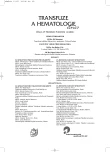Significance of immunotherapy with anti-CD20 rituximab and high-dose chemotherapy with autologous peripheral blood stem-cell transplantation in first-line treatment for mantle-cell lymphoma – centre experience
Význam imunoterapie anti-CD20 rituximab a vysokodávkované chemoterapie s autologní transplantací periferních krvetvorných buněk v první linii léčby mantle cell lymfomu – zkušenosti centra
Mantle cell lymfom patří mezi prognosticky nepříznivé lymfoidní neoplázie, které jsou konvenční chemoterapií inkurabilní. U 48 pacientů s tímto lymfomem byl sledován efekt indukční léčby (CHOP-21 nebo intenzifikovaný antracyklinový režim 3. generace dle Th. Waitse u 20/48 pacientů, CHOP-21 s následnou imunoterapií anti-CD20 rituximab u 18/48 a VAD+chlorambucil u 10/48) a také efekt autologní transplantace periferních krvetvorných buněk provedené v první linii u 19/48 léčených. Protokolem CHOP-21 s následnou imunoterapií anti-CD20 rituximab bylo dosaženo stavu kompletní remise častěji ve srovnání s antracyklinovou indukcí bez následné anti-CD20 léčby a nebo protokolem VAD+chlorambucil (77 % vs. 30 % vs. 10 %, p = 0,011). Autologní transplantace dále zvýšila četnost kompletních remisí z 47 % na 94 %. V celém souboru s mediánem sledování 41 (12–116) měsíců došlo k relapsu/progresi u 79 % pacientů s mediánem do relapsu/progrese 20 (2–66) měsíců a zemřelo 60 % pacientů s mediánem OS 30 (1–81) měsíců. I přes intenzifikaci léčby s autologní transplantací krvetvorných buněk v první linii a doplnění imunoterapie s protilátkou anti-CD20 rituximab zůstává prognóza pacientů s MCL nadále nepříznivá.
Klíčová slova:
mantle cell lymfom, autologní transplantace, chemoterapie, rituximab
Authors:
S. Vokurka; V. Koza; P. Jindra; K. Steinerová; V. Vozobulová; M. Schutzova; D. Lysák; M. Švojgrová; L. Mohammad; M. Karas; T. Svoboda
Authors‘ workplace:
Hematologicko-onkologické oddělení, Fakultní nemocnice v Plzni
Published in:
Transfuze Hematol. dnes,12, 2006, No. 4, p. 240-243.
Category:
Comprehensive Reports, Original Papers, Case Reports
Overview
Mantle cell lymphoma is a lymphoid neoplasia with unfavorable prognosis, incurable by means of conventional chemotherapy. In 48 patients suffering with this lymphoma an effect of induction chemotherapy (CHOP-21 or intensified anthracyclines-based regimen by Th.Waits in 20/48 patients, CHOP-21 with sequential imunotherapy anti-CD20 rituximab in 18/48 and VAD+chlorambucil in 10/48) and an effect of autologous peripheral blood stem cells transplantation in 19/48 patients were analyzed. Complete remission was more often reached in CHOP induction regimen followed with anti-CD20 immunotherapy in comparison to anthracyclines-based regimens without anti-CD20 or compared to VAD+chlorambucil protocol (77 % vs. 30 % vs. 10 %, p = 0,011). The autologous transplantation further improved the number of complete remissions from 47 % to 94 %. With the median follow-up of 41 (12–116) months, in the whole cohort of patients, 79 % of patients relapsed/progressed with the median time to relaps/progression of 20 (2–66) months, and 59 % of patients died with the median overall survival of 30 (1–81) months. Despite intensified first-line treatment with autologous stem cell transplantation and addition of anti-CD20 immunotherapy, the prognosis of mantle cell lymphoma patients remains poor.
Key words:
mantle cell lymphoma, autologous transplantation, chemotherapy, rituximab
Labels
Haematology Internal medicine Clinical oncologyArticle was published in
Transfusion and Haematology Today

2006 Issue 4
- Monitoring of Joint Health is an Important Part of Hemophilia Care
- Minimum and Optimal Factor Levels in Physically Active Hemophiliacs
- Position of aPCC in the Treatment of Hemophilia A Complicated by the Development of Inhibitors
- Administration of aPCC as a Prevention of Bleeding After Major Cardiac Surgical Procedures
- Cost Effectiveness of FVIII Substitution Versus Non-Factor Therapy for Hemophilia A
-
All articles in this issue
- Quality parameters of cryopreserved red cells reconstituted in AS-3 solution (Nutricel)
- Computer crossmatch - performance, validation and first implementation in the Czech Republic
- Indications of allogeneic and autologous haematopoietic cells transplantations. Recommendations of the Czech Socienty of Haematology and Czech Society of Oncology of the J. E. Purkyně Czech Medical Association
- The risk factors analysis in 248 patients with B-cell chronic lymphocytic leukemia at diagnosis
- Significance of immunotherapy with anti-CD20 rituximab and high-dose chemotherapy with autologous peripheral blood stem-cell transplantation in first-line treatment for mantle-cell lymphoma – centre experience
- Evaluation of antigen-specific lymphocytes anti-tumour effect with use of non-radioactive cytotoxicity test
- B-cell chronic lymphocytic leukemia Part III: Current conventional options of first-line treatment
- Transfusion and Haematology Today
- Journal archive
- Current issue
- Online only
- About the journal
Most read in this issue
- Computer crossmatch - performance, validation and first implementation in the Czech Republic
- Significance of immunotherapy with anti-CD20 rituximab and high-dose chemotherapy with autologous peripheral blood stem-cell transplantation in first-line treatment for mantle-cell lymphoma – centre experience
- Quality parameters of cryopreserved red cells reconstituted in AS-3 solution (Nutricel)
- Evaluation of antigen-specific lymphocytes anti-tumour effect with use of non-radioactive cytotoxicity test
